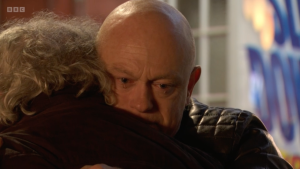In a storyline that has left EastEnders fans emotional and begging for more, Grant Mitchell returned to Albert Square in a short but powerful arc to mark the show’s 40th anniversary. But while he walked out of Walford once again, the door remains wide open — and perhaps, just perhaps, his next comeback won’t be as brief.
Ross Kemp, who has embodied the rough-around-the-edges but loyal Grant since 1990, slipped back into the role like no time had passed. His character’s appearance stirred nostalgia and unresolved drama, not only bringing back memories of classic Mitchell brawls but also unearthing decades-old secrets and relationships.
In scenes that tugged at the heartstrings, Grant found himself emotionally tangled with multiple residents of Walford. First, there was his surprising reconnection with Bianca Jackson, a woman tied to his painful past through his late wife Tiffany. When Grant found Bianca suffering a panic attack in the launderette, a rare softness emerged from the Mitchell hardman. He talked her through it, helping her breathe and understand she might be suffering from PTSD after everything Reiss had put her through. It was a stark reminder: even the toughest men carry scars — and can offer healing.

Later, Grant reflected on his own self-destructive ways since arriving back in the Square. “All I’ve done is shout, argue, and sleep with someone I shouldn’t have,” he confessed to Bianca, clearly referencing his one-night stand with Sharon Watts — his brother Phil’s long-time love and former wife. Bianca, in classic Bianca fashion, didn’t let him off the hook. She called him out for running again and urged him to face the wreckage he’d left behind before disappearing.
And that’s exactly what Grant tried to do.
In a deeply emotional scene, he went to Phil’s side at the mental health unit, finally confronting the guilt that had haunted him — guilt over not being there when Phil spiraled. He apologized, voice trembling, but notably didn’t reveal his secret tryst with Sharon. Phil had just told him he still loved her, and in a rare act of self-control, Grant chose silence over betrayal.
But before leaving, Grant made one final offer — not to Phil, but to his lifelong friend Nigel Bates. Grant pleaded with Nigel to join him in Portugal, promising to take care of him as he battles early-onset dementia. “I’ll give you as many sponge baths as you need,” he joked with that trademark Mitchell humor, trying to mask the genuine fear of losing his oldest mate. Nigel, however, chose to remain in Walford, standing alone at the station platform as Grant walked away — this time, in tears.
Yet this wasn’t just a farewell. It was also a reawakening.
Grant’s fleeting time back in Walford cracked open long-buried truths — like the revelation that Mark Fowler Jr. may, in fact, be Grant’s biological son. The tension between unresolved relationships and looming regrets sets the stage for potential future returns. And fans couldn’t help but notice: the sparks between Grant and Sharon are still very much alive.
Behind the scenes, Ross Kemp has admitted that his return was emotional — and that he owes a lot to EastEnders. Speaking to The Sun, Kemp said the experience was both surreal and meaningful. “It’s a home from home,” he reflected, having worked with the cast and crew since 1989. And while he’s now more well-known for his hard-hitting documentaries and game show Bridge of Lies, the idea of returning to Albert Square full-time isn’t off the table.
In fact, Kemp revealed the one thing that might bring Grant Mitchell back for good: a personal ask from Steve McFadden, who plays his on-screen brother Phil. “If Steve asked me, of course I would,” Kemp said sincerely. The two actors share a deep off-screen bond, one that mirrors their complicated on-screen brotherhood.
However, Kemp also acknowledged the toll of EastEnders’ demanding schedule. “It’s a tough gig. Long days, high energy. I take my hat off to Steve for keeping that up for 35 years,” he said. With other commitments like hosting and producing, a full-time return would depend on timing — but, as Kemp put it, “Never say never.”





